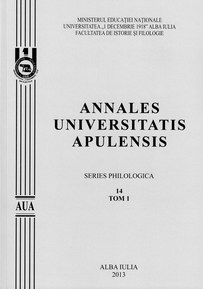Mitropolitul Varlaam – condiţia autorului în predoslovii
Metropolitan Varlaam – the author’s condition in prefaces
Author(s): Lavinia GeambeiSubject(s): Literary Texts
Published by: Universitatea »1 Decembrie 1918« Alba Iulia
Keywords: preface; author; reader; discourse; pragmatics
Summary/Abstract: G. Mihailă, in his study Beginnings and self-consciousness of the old Romanian literature (in Romanian literature history, Studies, scientific coordinator Zoe Dumitrescu Bușulenga, Bucharest, R.S.R. Academy Publishing House, 1979), wrote about Dawn of Humanism and the Renaissance in the Romanian Lands. The first texts in Romanian (16th century), after quoting translations of manuscripts and publications of the time and stating: "Obviously, in strictly literary terms, prefaces and epilogues of books are valuable manifestos.... " (p. 57). We note here the special value of different preambles and epilogues accompanying texts in ancient literature and extend G. Mihaila’s observation to the texts of the 17th century, without minimizing their literary value. The texts preceding or following the printed texts themselves, shed light on how the author assumes his condition, be it original texts altogether or compilations and translations, because these scholars were not only simple translators, who carried out a painstaking work, which involves selecting, processing, adaptation and harmonious combination of so many sources into a single text. Therefore, we use the term author with a broad meaning, even as the initiator of an act of culture. These preambles and epilogues stand for the author’s speech, who feels the need to justify his work to the readers. As regards the need of justification, Dominique Maingueneau (Pragmatics for the literary discourse, translation Raluca-Nicoleta Balaţchi, Iaşi, European Institute, 2007) considered: "The mere act of speaking (for proposing a work to the public works does not mean making a superlative speech?) is a specific territorial incursion that requires remedial action. All forms of captatio benevolentiae loved by rhetoric are only an illustration of this need" (p. 163). This "part of text negotiation" as called by pragmatics, is found usually in the prefaces, forewords and preambles of various types. Starting from these premises, the present paper proposes an approach of the literary discourse in terms of pragmatics based on two such texts belonging to Metropolitan Varlaam, scholar artist who is among the key figures of the Romanian humanism in the 7th century. The two texts subject to our analysis are: Cuvântul către cetitoriu al Cazaniei (1643), Predoslovie la Cartea care să cheamă Răspunsul împotriva catihismusului calvinesc (1645).
Journal: Annales Universitatis Apulensis. Series Philologica
- Issue Year: 14/2013
- Issue No: 1
- Page Range: 147-156
- Page Count: 10
- Language: Romanian

